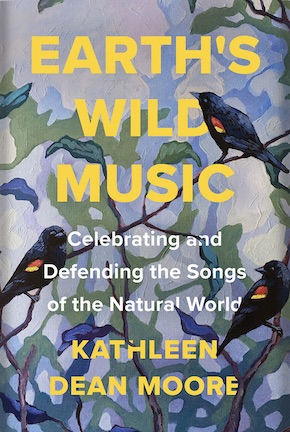A symphony of life
by John C. Krieg
“At once heartbreaking and uplifting, Earth’s Wild Music is a love song to a vanishing world.” Elizabeth Kolbert
The daughter of a biologist, the wife of a biologist, and the mother of a biologist, it’s safe to say that Kathleen Dean Moore has an affinity for biology, environmentalism specifically, and comes across as a staunch activist concerning the deleterious effects of climate change in her most recent collection of essays Earth’s Wild Music: Celebrating and Defending the Songs of the Natural World.
Awarded Distinguished Professor of Philosophy status at Oregon State University in 2006, Moore developed a field course entitled Philosophy of Nature, which she conducts in the lake country of the Pacific Cascades. This is an outdoorswoman who has spent the bulk of her life postulating the theory that humankind has a moral responsibility to care about the welfare and survival of the other species that occupy our planet with us.
Viewing the sounds of the natural world, especially those emanating from songbirds, as the grand symphony of life, Moore laments that these voices are falling silent at the onslaught of Earth’s sixth great extinction, which is already well underway. Species populations are in rapid decline; well beyond fifty per cent of where they were a mere decade ago. The author takes dead aim at the awesome lobbying power of the global fossil fuel industry, the extraction mentality of insatiably profit-driven corporations, and the staggering loss of habitat due to wildfires and flooding as the Earth continues to warm at an alarming rate.
In her emotional final plea to humanity to save itself from itself, Moore writes:
Any culture that prides itself on accumulating wealth instead of sharing it, any culture that gobbles up the fecundity of the planet instead of nurturing it, any economy that eats its own feet, any economy of infinite extraction, will kill off the sources of its material and spiritual sustenance – the growing things, plants and animals – and ultimately itself.
Moore is now 74 years old and still fighting the good fight, although it must be exhausting. But as she so eloquently states, when all that appears to be left is hope, then hope is what you cling to. Environmentalists and a select few American politicians, Alexandria Ocasio-Cortez of note, are now sounding the warning alarm with an increased sense of urgency. All state that the Earth only has ten years – one decade – if that, before it will be irrevocably too late to back away from the brink of environmental collapse, and yet climate deniers, corporate bullies and religious zealots all seem to not take the threat too seriously, or to welcome the end as their culminating blaze of glory that will allow them to achieve their concept of nirvana. For the rest of us, those who care deeply about their children and grandchildren and what kind of a world they will inherit, the sounds of the natural world are now a blaring SOS heard loud and clear. If the worldwide Coronavirus pandemic has taught the family of man anything, it has taught us that we are all in this together.
Written with an orchestra conductor’s ear and the lyricism of sensitive poet, Earth’s Wild Music is an important contribution to the cause of environmental activism on a global scale. It’s my considered opinion, as an environmental writer, as a landscape architect, and as a caring human being with innocent grandchildren living here in my home, that this is the most important environmental book written thus far in the new millennium.
 Kathleen Dean Moore is a writer, moral philosopher and environmental advocate. As a writer, she first came to public attention with award-winning books of essays that celebrate and explore the wild world of rivers, islands, and tidal shores – Riverwalking, Holdfast, Pine Island Paradox and Wild Comfort. Her first climate ethics book, Moral Ground: Ethical Action for a Planet in Peril (co-edited with Michael P. Nelson, with a foreword by Desmond Tutu, 2010) gathered testimony from the world’s moral leaders about humanity’s obligation to the future. In 2016, she published Great Tide Rising: Finding Clarity and Moral Courage in a Time of Planetary Change, and the novel Piano Tide. Her essays are widely published and anthologised. For many years, she taught critical thinking and environmental ethics as Distinguished Professor of Philosophy at Oregon State University. She is currently a member of the Council for an Uncertain Human Future at Clark College, Massachusetts. She is co-author with Thomas A. Kearns of Bearing Witness: The Human Rights Case Against Fracking and Climate Change (Oregon State Press, March 2021). Earth’s Wild Music is published by Counterpoint Press.
Kathleen Dean Moore is a writer, moral philosopher and environmental advocate. As a writer, she first came to public attention with award-winning books of essays that celebrate and explore the wild world of rivers, islands, and tidal shores – Riverwalking, Holdfast, Pine Island Paradox and Wild Comfort. Her first climate ethics book, Moral Ground: Ethical Action for a Planet in Peril (co-edited with Michael P. Nelson, with a foreword by Desmond Tutu, 2010) gathered testimony from the world’s moral leaders about humanity’s obligation to the future. In 2016, she published Great Tide Rising: Finding Clarity and Moral Courage in a Time of Planetary Change, and the novel Piano Tide. Her essays are widely published and anthologised. For many years, she taught critical thinking and environmental ethics as Distinguished Professor of Philosophy at Oregon State University. She is currently a member of the Council for an Uncertain Human Future at Clark College, Massachusetts. She is co-author with Thomas A. Kearns of Bearing Witness: The Human Rights Case Against Fracking and Climate Change (Oregon State Press, March 2021). Earth’s Wild Music is published by Counterpoint Press.
Read more
riverwalking.com
Buy at bookshop.org
Music to Save Earth’s Songs
Under the banner of ‘Music to Save Earth’s Songs’, the Spring Creek Project at Oregon State University has launched The Extinction Variations, a film by Eric Gleske and Nara Garber in which classical pianist Rachelle McCabe’s performance of Rachmaninoff’s Variations weaves through Kathleen Dean Moore’s words from Earth’s Wild Music; and Animal Interludes, a series of short films combining birdsong and readings from the book with musical performance to celebrate and defend all the planet’s howling, warbling, humming creatures.
More info
John C. Krieg is a retired landscape architect and land planner who practised in Arizona, California and Nevada. He is the author of the college textbook Desert Landscape Architecture (CRC Press, 1999), and has had pieces published in A Gathering of the Tribes, Alternating Current, Blue Mountain Review, The Mindful Word, Wilderness House Literary Review and elsewhere. He is based in Anza, southern California.

